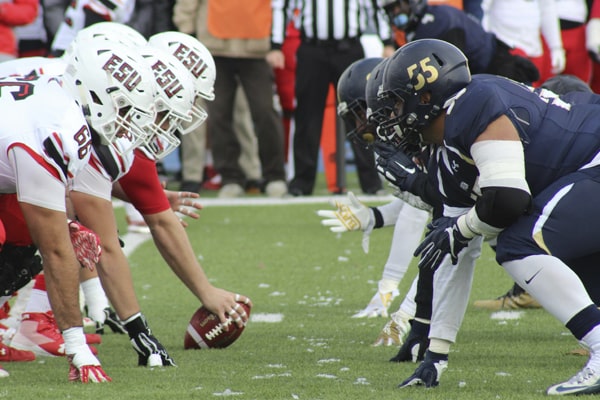The Impact of Sports Betting on Football Revenue in North Carolina
While in-person sports betting at casinos and other physical locations has been legal in North Carolina since 2019, the state is set to launch their mobile sportsbooks sometime in January 2024, bringing the ability to place wagers to a much wider audience.
Whether you’re waiting patiently for the launch date so that you can begin betting yourself, or if you’re simply curious how the process will shake out from a financial standpoint, here’s everything you need to know about how the pending launch will affect revenue here in North Carolina.
Sports Gambling: The Big Picture
In analyzing how legalized sports betting impacts the state economy, it’s important to look at things from a big picture perspective. At face value, a thriving betting market may seem like it benefits two groups: successful gamblers, and the sportsbooks themselves. The reality is that these ties go much deeper than that, with things like tax law making it so that even thriving corporations are giving back to their local communities.
Furthermore, another thing that acts in North Carolina’s favor is the diverse success that their sports teams enjoy. Whether on the professional level with the Carolina Hurricanes, Panthers and Charlotte Hornets or with the many college teams who call the Tar Heel State home, having a plethora of teams to root for and, therefore, betting options to choose from, helps drive interest in the pastime and spur the economy. Here are some specific examples of those trends.
UNC’s ACC Championship Pursuit: Success Begets Success
Having a thriving sports market will always spur a higher volume of bets placed. With things like point spreads and over/unders, it’s possible to bet on your favorite team even if you don’t think they’re going to win a game, but the simple fact of the matter is that it’s easier to get excited about your favorite team — and, therefore, more tempting to bet on it — when they’re enjoying a high degree of success.
Right now, the North Carolina Tar Heels football team has some of the best odds to win the ACC championship game at North Carolina Sports Betting sites. That fact should immediately pique the interest of Tar Heels fans who want to see their team win.
The Carolina Panthers, similarly, picked up a lot of buzz this offseason after adding first overall pick Bryce Young to an already talented roster. For much of the summer, Young had the best odds of winning the offensive rookie of the year award. That didn’t end up panning out, as Young and the Panthers have struggled mightily this season, but it’s another example of how a team’s success — whether current or expected — can boost the betting market.
What’s more, if a local team is succeeding there’s going to be more buzz around them. You’re going to see billboards promoting their tickets, you’re going to hear radio talk show hosts discussing them on the morning drive, see the games on TV when you go out to dinner or hear conversations about them in passing. Having that sort of pervasive grassroots promotion can be enough to drive interest, and many sports teams are engaging in endorsement deals with gambling platforms these days too.
Increased interest in a football team, players encourages the betting market which can, in turn, pay that money forward right back into the teams themselves, a sort of recurring feedback loop that boosts the sporting economy.
Gambling Taxes and Youth Sports
Another way that sports betting impacts football revenue in North Carolina is through tax law. The Tar Heel State charges prospective sportsbooks a $1 million licensing fee in order to begin operation. After that, they levy a 14 percent tax on the sportsbooks’ net revenue each year, along with a 5.25 percent tax on the amount that the average Joe wins at the books.
Some of those tax dollars are then paid back into the communities. The state budget for the 2023-2024 fiscal year projects an allocation of $1 million toward the NC Division of Parks and Recreation, earmarked for upgrades for youth sports equipment and facilities across the state.
Another $2.1 million is slated for seven North Carolina universities, paid out in the form of $300,000 grants apiece, dedicated to their collegiate athletics programs.
Last, but not least, the North Carolina Heritage Advisory Council will receive $1 million. They’ll then issue $5,000 grants to youth and school sports teams who need help funding travel budgets, and they’ll also use some of that money to attract various state, regional, and national sporting events to stimulate the state and local economies further.
Don’t Miss To Follow SuperbHub For More Updates On Celebrity Biography, News, And Entertainment.
Recent News
-

Duane Chapman Is Now Engaged To Girlfriend Francie Frane, Had Lost Wife 10 Months Earlier
-

Katherine Schwarzenegger Pregnant With Her First Child With Husband Chris Pratt
-

Chris Cuomo's Son Mario Tested Postive For Coronavirus
-

Kodak Black And NBA YoungBoy, Dissing One Another Via Social Media
-

Maeve Kennedy McKean, Robert F. Kennedy's Granddaughter, is Missing Along With Her Son
Entertainment
-

The Evolution of Entertainment: Online Casting Calls Redefining the Industry
-

Mamoudou Athie's Must-Watch Performances in the Movies and TV Series
-

Try These Unique Forms of Entertainment When You've Exhausted All Options
-

7 Best Movies on Netflix This Week
-

Campus Grooves: Exploring Music Festivals in American Colleges





